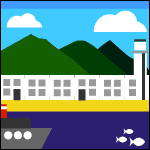Dellys, Boumerdes, Algeria
Created | Updated Jun 7, 2011

Dellys is a small Mediterranean port in Algeria, about 60 miles east of Algiers. Its main attractions are:
- Some great beaches
- A nice old quarter or Casbah, full of whitewashed walls and traditional cube-shaped houses
- The deep caves by the coast
These attractions are, however, offset by terrible roads, and regular cuts in power and water supplies and telephone service.
Its main neighbourhoods are the Port, the Casbah, la Cité (the town centre), Bordj-Fnar (around the lighthouse), el-Qus (to the west), and Ladjenna (further west). Nearby villages include Takdempt and Sahel. The mountains behind it (forested, except when burned down) are called Assouaf and Bouberrak.
Although Dellys is on the edge of the Berber-speaking area called Kabylie, for the most part its inhabitants speak Algerian Arabic.
The coast is dotted with little rock islands, residues of a former volcano. There is a fairly wide selection of fish, some dolphins in spring, and too many sea-urchins. If you come between about May and September, go swimming!
Also, try eating the sea-urchins - only fair considering what they do if you step on them1. The light-coloured bits inside taste quite good on bread. The Japanese eat sea-urchin sushi and consider it a delicacy, but it's far better with bread.
The Romans
Although a few Stone Age flints were found at Takdempt, Dellys was, strictly speaking, founded by the Phoenicians about 2500 years ago. They called it Rush-Uqerru ('Cape of Fish'), but the only relics they left behind are an inscribed tombstone and a couple of jars.
The Romans took it over after the Punic wars, changing the name to Rusuccuru2, and building a substantial town, large enough to be mentioned by most Roman geographers. 18th Century travellers such as Thomas Shaw report seeing vast Roman ruins on the site, but the French unfortunately decided to expand the town directly on top of the ruins, and no one's about to pull down the modern town just to get a look at the old one! You can still see a Roman wall that was incorporated into the local technical college, though, and the museum in Algiers has a carved Christian sarcophagus from Dellys.
The Vandals
After the collapse of the Roman Empire the area was eventually conquered by the Vandals, and there don't seem to be any reports on the town for a few centuries. Some time after the Arabs arrived, however, it rose forth again, now under the name of Tedelles. It became an important port city, known (according to various medieval geographers) for the low price and high quality of its food, and the size of its still-surviving walls. It's not much to be famous for, but there you are...
At some point during this period it lay uncomfortably close to the boundary between two main Algerian kingdoms, one centred on Bejaia (or sometimes Tunis), and the other centred on Tlemcen. As a result, it suffered various invasions and counter-invasions. Otherwise, it remained fairly quiet.
The Corsairs
After about 1500, when the Spanish had disposed of the last Arab kingdom on their soil, their fleet started marauding all along the North African coast, sacking Annaba (Bone), conquering Oran outright, besieging and obtaining tribute from Algiers, and generally making life very uncomfortable for North African ports.
Their reaction was to call in some Ottoman corsairs or pirates to deal with the problem: specifically, the brothers Aruj and Khair ad-Din (better known in the West as the Barbarossa brothers). They based themselves in Dellys for a while, but eventually moved full-time to Algiers and drove out the Spanish. They killed the local ruler Salim and took the place over for the Ottoman empire.
They were, however, forgiven for all this by the locals because they established an extensive fleet. This was to prey on Spanish and all allied shipping, and kept most of the coast safe from Spanish attack. The most common Western version of this story, that Algiers was taken over by a ruthless Ottoman freebooter who established a pirate fleet, conveniently omits these circumstances. A further ironic point is that Aruj had himself once been taken by Greek pirates, and spent several years as a galley slave in Europe.
The French
Under Ottoman rule, Dellys seems to have declined in importance. Later travellers report a fishing and dyeing town far too small for the walls surrounding it. It was conquered by the French in 1844, soon after they took Algiers. They built a railway as well as significant portions of the newer areas of town (on top of the Roman ruins), and established a military base. But the French were never popular, and were eventually driven out by a revolution that lasted from 1954 to 1962. Now, after independence, it's a small town, but a reasonably nice one.
Advice for Travellers
You're in the wrong country! Things may have calmed down a bit, but it's still fairly dangerous for foreigners in Algeria.
Just take a public bus, you can blatantly afford it...
The sand-like stuff in that dish is called 'couscous' (or, locally, ta'aam). It tastes very good - honestly.
No, not everybody speaks French. And if they can, they may still have some trouble with an English accent.
The most dangerous animal you're likely to encounter is the feral dog. Lion, leopard and elephant are all very long since extinct here (though some of the oldest inhabitants can remember seeing lions in their youth).
If you come in winter, don't swim unless you're English, in which case you'll be quite used to the sea temperature, and will provide some amusement for the locals. Also, expect to get rained on.
Dress reasonably conservatively. Shorts are acceptable on the beach, but are a definite faux pas anywhere else. Bikinis are also probably a bad idea.
There's a cybercafé somewhere in town, so you can still access h2g2.
Enjoy!

